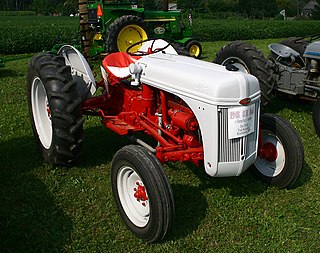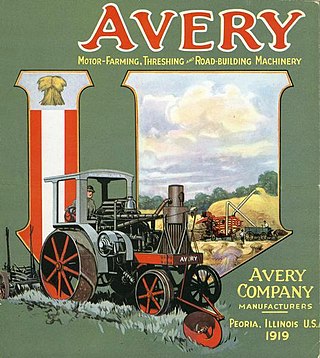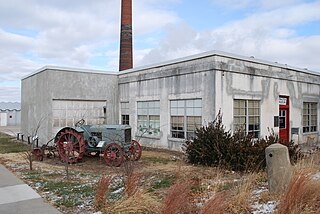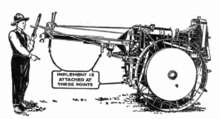
A tractor is an engineering vehicle specifically designed to deliver a high tractive effort at slow speeds, for the purposes of hauling a trailer or machinery such as that used in agriculture, mining or construction. Most commonly, the term is used to describe a farm vehicle that provides the power and traction to mechanize agricultural tasks, especially tillage, and now many more. Agricultural implements may be towed behind or mounted on the tractor, and the tractor may also provide a source of power if the implement is mechanised.

Deere & Company, doing business as John Deere, is an American corporation that manufactures agricultural machinery, heavy equipment, forestry machinery, diesel engines, drivetrains used in heavy equipment, and lawn care equipment. The company also provides financial services and other related activities.

Fordson was a brand name of tractors and trucks. It was used on a range of mass-produced general-purpose tractors manufactured by Henry Ford & Son Inc from 1917 to 1920, by Ford Motor Company (U.S.) and Ford Motor Company Ltd (U.K.) from 1920 to 1928, and by Ford Motor Company Ltd (U.K.) from 1929 to 1964. The latter also later built trucks and vans under the Fordson brand.

Allis-Chalmers was a U.S. manufacturer of machinery for various industries. Its business lines included agricultural equipment, construction equipment, power generation and power transmission equipment, and machinery for use in industrial settings such as factories, flour mills, sawmills, textile mills, steel mills, refineries, mines, and ore mills.

Minneapolis-Moline was a large tractor and farm and industrial machinery producer based in Minneapolis and Hopkins, Minnesota, Minnesota known for its Minneapolis-Moline tractor line. It was the product of a merger of three companies in 1929: Minneapolis Steel & Machinery (MSM) which was noted for its Twin City tractors, Minneapolis Threshing Machine Company (MTM) which also produced Minneapolis tractors, and the Moline Implement Company formerly known as the Moline Plow Company. It had manufacturing facilities on Lake Street at Hiawatha Avenue in Minneapolis, MN, in Hopkins, MN and in Moline, IL. Originally known as the Minneapolis-Moline Power Implement Company, and later shortened Minneapolis-Moline Company. Motec Industries was a short lived corporate name change from ca. 1960 until the companies acquisition by White Motor Corporation in 1963. <<prairiegoldrush.com>>

Farmall was a model name and later a brand name for tractors manufactured by International Harvester (IH), an American truck, tractor, and construction equipment company. The Farmall name was usually presented as McCormick-Deering Farmall and later McCormick Farmall in the evolving brand architecture of IH.

The Ford N-series tractors were a line of farm tractors produced by Ford between 1939 and 1952, spanning the 9N, 2N, and 8N models.

Yanmar Co., Ltd. is a Japanese diesel engine, heavy machinery and agricultural machinery manufacturer founded in Osaka, Japan in 1912. Yanmar manufactures and sells engines used in a wide range of applications, including seagoing vessels, pleasure boats, construction equipment, agricultural equipment and generator sets. It also manufactures and sells, climate control systems, and aquafarming systems, in addition to providing a range of remote monitoring services.

The Avery Company, founded by Robert Hanneman Avery, was an American farm tractor manufacturer famed for its undermounted engine which resembled a railroad engine more than a conventional farm steam engine. Avery founded the farm implement business after the Civil War. His company built a large line of products, including steam engines, beginning in 1891. The company started with a return flue design and later adapted the undermount style, including a bulldog design on the smokebox door. Their design was well received by farmers in central Illinois. They expanded their market nationwide and overseas until the 1920s, when they failed to innovate and the company faltered. They manufactured trucks for a period of time, and then automobiles. until they finally succumbed to an agricultural crisis and the Depression.

Two-wheel tractor or walking tractor are generic terms understood in the US and in parts of Europe to represent a single-axle tractor, which is a tractor with one axle, self-powered and self-propelled, which can pull and power various farm implements such as a trailer, cultivator or harrow, a plough, or various seeders and harvesters. The operator usually walks behind it or rides the implement being towed. Similar terms are mistakenly applied to the household rotary tiller or power tiller; although these may be wheeled and/or self-propelled, they are not tailored for towing implements. A two-wheeled tractor specializes in pulling any of numerous types of implements, whereas rotary tillers specialize in soil tillage with their dedicated digging tools. This article concerns two-wheeled tractors as distinguished from such tillers.

Stewart & Stevenson is a manufacturer and distributor of products and services for the oil and gas, marine, construction, power generation, transportation, mining and agricultural industries.
Cockshutt was a large agricultural machinery manufacturer, known as Cockshutt Farm Equipment Limited (1957–1962), based in Brantford, Ontario, Canada.

The Oliver Farm Equipment Company was an American farm equipment manufacturer from the 20th century. It was formed as a result of a 1929 merger of four companies: the American Seeding Machine Company of Richmond, Indiana; Oliver Chilled Plow Works of South Bend, Indiana; Hart-Parr Tractor Company of Charles City, Iowa; and Nichols and Shepard Company of Battle Creek, Michigan.

The Lester F. Larsen Tractor Test and Power Museum is a museum dedicated to preserving and documenting the history of Nebraska's tractor test law, operated by the University of Nebraska–Lincoln (NU) in Lincoln, Nebraska, United States. The Nebraska Tractor Test Law, passed in 1919 and administered by the university, requires performance testing on every tractor with forty horsepower or more sold in the state. The facility, initially established as the Nebraska Tractor Test Laboratory, was renamed for longtime chief engineer Lester F. Larsen when it was converted into a museum in 1998. It is the only tractor testing museum and the only complete tractor test laboratory in the world.
Willard Lamb Velie was a businessman based in Moline, Illinois. He was an executive at Deere & Company before starting his own companies, which grew to become Velie Motor Company. He developed advanced engines for automobiles and airplanes.

The Allis-Chalmers Model 6-12 was a farm tractor produced by Allis-Chalmers between 1918 and 1923. Like many other tractors of the era, its model name came from its horsepower ratings, with 6-12 meaning 6 hp at the drawbar and 12 hp at the belt pulley.
Jacobsen Manufacturing has produced lawn mowers and light-duty tractors in the United States from the early 1920s until around 2020. They were located in Racine, Wisconsin from 1921 to 2001, when they moved to Charlotte, North Carolina. In 2017, Jacobsen moved from Charlotte to Augusta, Georgia. In 2020, it was announced they would relocate from Augusta, Georgia to their sister factory of Ransomes-Jacobsen in Ipswich, England, UK. They are currently owned by Textron since acquisition in 1975.
William Alexander Hewitt was the former chairman of Deere & Company of Moline, Illinois, and the last of the Deere Family to run the company. He served as United States Ambassador to Jamaica from 1982–1985.
















